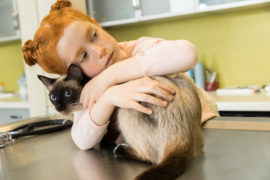“Your pet is a family member,” says PetLossAtHome.com co-owner, Rob Twyning. “Your not simply a pet owner, you’re a friend.” That friendship and companionship will be a difficult loss when your dog or cat passes. It’s important to take time to mourn that loss for your health and to honor the pet that is no longer around.
People who’ve never had a dog or a cat can be a little dismissive of your loss. They’ll say it’s ‘just a pet, get over it.’ Pet owners know the loss is way more meaningful than that. When you look at the number of years a pet shares your same space – from a few years to more than a decade – the disappearance of that daily bond hurts.
Brace yourself for the loud quiet
The American Veterinary Medical Association says just the silence can be hard to handle. “It can be excruciatingly loud. Many times their presence is felt more with your senses. When that pet is no longer there, the lack of their presence is piercing. It becomes the reality of the ‘presence of the absence.’ Merely being aware of this stark reality will assist in preparing you for the flood of emotions.”
Take your time
If the demands of your job permit, think about taking a day (or more) to grieve. Talk to family and express how your feeling. Or head off to your pet’s favorite place and talk to yourself, even out loud. The time is a way of honoring your pet and your healing. The talking is cathartic and helps you frame the important priority the pet held in your life for so long.
“Mostly, what we mean by ‘take your time,’” says Twyning, “Is don’t rush into getting another pet to fill the silence.”
Mind your health
Don’t underestimate the physical toll an emotional loss can have. The New England Journal of Medicine reported in October 2017 that after her dog died, a woman experienced ‘broken heart syndrome.’ It’s a real thing. It’s a condition in which the response to grief is so severe the person exhibits symptoms that mimic a heart attack. Symptoms include elevated hormone levels that can be 30 times greater than normal.
Moving on has stages
In 1969, a Swiss-American psychiatrist named Elizabeth Kübler-Ross wrote in her book “On Death and Dying” that grief could be divided into five stages. Denial. Anger. Bargaining. Depression. Acceptance. They’re part of a framework that makes up our learning to live without the one we lost. They don’t have to go in order. There isn’t a timeline. Just know that every pet owner who’s lost has been through stages. There is, at some point, the comfort of accepting and moving on from a loss.
To ask more questions, please reach out to Rob Twyning – Co-Founder, and include your city, state, or ZIP code so we can direct your questions to our local veterinarian team member in 50 metro areas.
Image by Serg Pozanskiy, used with permission.